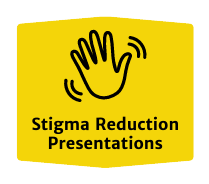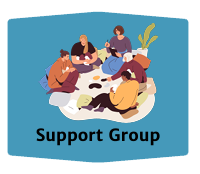Special Messages is a safe space (currently virtual) where people can share about their experiences receiving messages, and learn more about their unique gifts. Special Messages is an interactive self-stigma-elimination campaign led by individuals who hear voices or have other extraordinary experiences and are dedicated to eliminating the stigma associated with mental health conditions. Through community education and interaction, Special Messages addresses the mental health concerns so many of us experience but don’t talk about.
Stigma Reduction PresentationsEach month we will feature a different topic relevant to Special Message receivers such as Self-disclosure - The Power and Importance of Language - Stigmatizing Language - and Labels vs. Identity among other topics.
|
Support GroupIn this group, we create space for participants to be supportive of one another and discover what’s right for them. We encourage participants to think and talk about their experiences in new ways. Acknowledging the relevance of the scope of special messages is empowering Accepting everyone where they are right now is validating. Participants in these support groups will be able to develop coping strategies and tools they can apply to their self-defined and directed wellness goals.
|
|
Join us for our monthly the first Friday of each month at 8105 Edgewater Dr, Suite 100 (South Wing), Oakland, CA 94621
12 pm – 2 pm Pacific Time *Please check the Calendar for the most recent updates. |
History
PEERS introduced Special Messages in 2014 in four phases.
Training: included twelve sessions of innovative curriculum designed to clearly communicate shared experiences
Outreach: designed to introduce the project to service providers, supporters, and isolated individuals
Fieldwork: Peer service providers shared their personal stories, handed out business cards and fliers, and became a consistent presence to stimulate safety and trust in the community.
Peer to Peer: Each person learned how to use their personal experiences and support the wellness of peers by identifying trauma and negative thoughts and increasing self-acceptance and wellness.
An extensive outreach campaign was designed to introduce the project to service providers, supporters, and isolated individuals. During this, the peer service providers began to build trust, effectively communicate, and educate the public about the project.
Tim Dreby _____ began facilitating a weekly Special Messages Group that ended in 2017.
Training: included twelve sessions of innovative curriculum designed to clearly communicate shared experiences
Outreach: designed to introduce the project to service providers, supporters, and isolated individuals
Fieldwork: Peer service providers shared their personal stories, handed out business cards and fliers, and became a consistent presence to stimulate safety and trust in the community.
Peer to Peer: Each person learned how to use their personal experiences and support the wellness of peers by identifying trauma and negative thoughts and increasing self-acceptance and wellness.
An extensive outreach campaign was designed to introduce the project to service providers, supporters, and isolated individuals. During this, the peer service providers began to build trust, effectively communicate, and educate the public about the project.
Tim Dreby _____ began facilitating a weekly Special Messages Group that ended in 2017.









